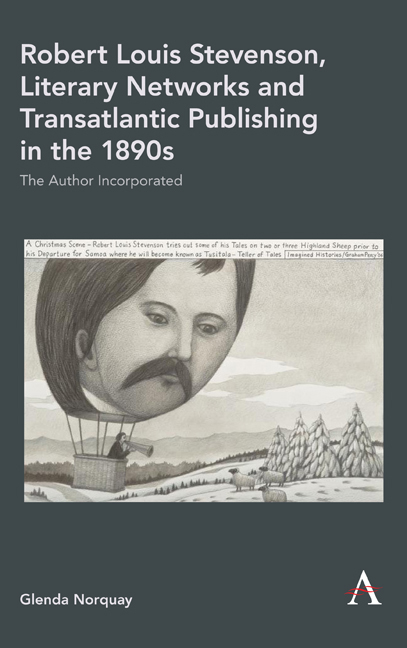 Robert Louis Stevenson, Literary Networks and Transatlantic Publishing in the 1890s
Robert Louis Stevenson, Literary Networks and Transatlantic Publishing in the 1890s Book contents
- Frontmatter
- Contents
- Acknowledgements
- Abbreviations
- Introduction
- 1 Lemuel Bangs: ‘The Senator’
- 2 A Tale of Two Texts
- 3 ‘A Gentleman Called Charles Baxter’
- 4 Sidney Colvin: Custodian and Monument
- 5 Family, Friends and Collaborators
- 6 Arthur Quiller-Couch: The Quivering Needle
- 7 Richard Le Gallienne: ‘Not While a Boy Still Whistles’
- Conclusion: Robert Louis Stevenson Incorporated
- References
- Index
3 - ‘A Gentleman Called Charles Baxter’
Published online by Cambridge University Press: 16 February 2020
- Frontmatter
- Contents
- Acknowledgements
- Abbreviations
- Introduction
- 1 Lemuel Bangs: ‘The Senator’
- 2 A Tale of Two Texts
- 3 ‘A Gentleman Called Charles Baxter’
- 4 Sidney Colvin: Custodian and Monument
- 5 Family, Friends and Collaborators
- 6 Arthur Quiller-Couch: The Quivering Needle
- 7 Richard Le Gallienne: ‘Not While a Boy Still Whistles’
- Conclusion: Robert Louis Stevenson Incorporated
- References
- Index
Summary
When the Edinburgh Edition of Stevenson's Collected Works was published, Charles Baxter was clearly inscribed in the text, his initials watermarked under a circle containing those of RLS, as a device to protect copyright. This chapter likewise writes Charles Baxter into the textual travels and transactions of Stevenson's writing. As Chapters 1 and 2 suggest, Baxter figured large in the ‘Stevenson business’ and was a particular source of irritation for Lemuel Bangs. For Stevenson, Baxter was also a powerful imaginative presence as well as lifelong friend and advisor. Recalling an evening – and morning – spent in a London tavern with Baxter, Richard Le Gallienne wrote:
He was a preposterously vital and imaginative talker, ample of frame, with a voice like a colonel of cavalry, and what a swash-buckler he would have made in the heroic days his friend loved to write of! With what an air of braggadocio he would have gone clanking into a tavern, with his long sword, and high boots and feathered hat!
In explicitly devolving business and literary roles to Charles Baxter and Sidney Colvin, Stevenson drew two very different characters into the orbit of his affairs. The ‘dry’ Sidney Colvin was allocated the literary side of publication; the ‘business’ sphere was conducted by someone who had all the characteristics of a Stevensonian adventurer – a friend ‘of the heart’ according to Fanny, rather than a ‘friend of the intellect’ like Colvin. His passionate loyalty to the best interests of Stevenson – alive or dead – created conflict. His ‘personality’, which included a drinking problem, led to difficult transactions around Stevenson's work. Yet it was this personality that made him Stevenson's friend, the recipient of a private joke correspondence played out over many years, and a powerful figure in Stevenson's imagination when he wrote fiction. Although the editor of letters between the two men, Marshall Waingrow, situates Baxter as ‘the straight man to Stevenson's imaginative soarings’; he acknowledges that his was a performance as ‘dead-pan collaborator’ to which he brought ‘genuine brilliance’. Le Gallienne's recollections suggest more of a shared ebullience and swashbuckling love of words. Baxter functioned as authorial representative in the matter of business, assuming the identity of embryonic literary agent.
- Type
- Chapter
- Information
- Robert Louis Stevenson, Literary Networks and Transatlantic Publishing in the 1890sThe Author Incorporated, pp. 81 - 98Publisher: Anthem PressPrint publication year: 2020


